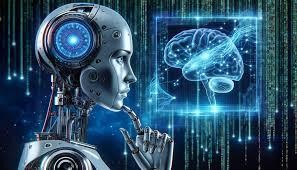
What is artificial intelligence?
What is artificial intelligence?
Artificial intelligence (Artificial Intelligence) broadly refers to any human-like behavior displayed by a machine or system. In the most basic form of artificial intelligence, computers use vast amounts of information from similar past patterns of behavior to “mimic” human behavior
programmed to do. This can range from recognizing the differences between a cat and a bird to performing complex activities in a manufacturing facility.
Whether you're talking about deep learning, strategic thinking, or some other type of AI, the core of its use is in situations that require lightning-fast responses. Machines with artificial intelligence supervised, unsupervised or
can work efficiently and analyze large amounts of data in the blink of an eye, solving problems through reinforcement learning.
Why is artificial intelligence important?
• Artificial intelligence automates iterative learning and data exploration. But artificial intelligence is different from hardware-driven robotic automation. Instead of automating manual tasks, AI performs frequent, high-volume, computerized tasks reliably and tirelessly. To build a system for this type of automation and
it still takes manpower to ask the right questions.
•Artificial intelligence adds intelligence to existing products. In most cases, AI will not be sold as standalone software. Instead, the products you already use will be enhanced with AI capabilities, such as Siri being added as a feature to the next generation of Apple products. Automation, conversational platforms, bots and intelligent machines can be combined with big data to improve many technologies in the home and workplace, from security intelligence to investment analysis.
• Progressive learning to allow artificial intelligence to deal with data programming
adapts through algorithms. Artificial intelligence finds structure and regularity in data, so the algorithm acquires a skill: a classifier or predictor. So, just as an algorithm can teach itself to play chess, it can also teach itself which product to recommend to a person on their next visit. And when new information comes to the models
adapts. Backpropagation is an artificial intelligence technique that allows the model to adjust through training and additional information when the initial response is not completely correct.
A brief history of artificial intelligence:
Until 1949, computers could execute commands, but because they couldn't store those commands, they couldn't remember what they did. In 1950, Alan Turing discussed how to build and test intelligent machines in his paper "Computing Machines and Intelligence".
Five years later, the first artificial intelligence program AI at Dartmouth
Presented at the Summer Research Project on Intelligence (DSPRAI). This event accelerated research into artificial intelligence for the next several decades. Between 1957 and 1974, computers became faster, cheaper, and more accessible. Machine learning algorithms improved, and in 1970 one of DSPRAI's presenters told Life Magazine that average intelligence was about one-third that of a general human.
it will be a machine with intelligence. Eight years.
Despite their successes, the inability of computers to store information efficiently or process it quickly hindered the pursuit of artificial intelligence for the next decade.
Artificial intelligence in the 1980s algorithmic toolkit
was revived with expansion and more allocated funds. John Hopefield and David Rumelhart
introduced "deep learning" techniques that allow computers to learn through experience. Edward
Feigenbaum introduced "expert systems" that mimic human decisions. Lack of government funding and public
Despite the hype, artificial intelligence developed and many important goals were achieved over the next two decades. In 1997, world chess champion and grandmaster Garry Kasparov was defeated by IBM's chess computer program Deep Blue. That same year, speech recognition software developed by Dragon Systems was introduced to Windows. Cynthia
Breazeal also developed a robot called Kismet that can recognize and display emotions.
In 2016, Google's AlphaGo program beat Go master Lee Se-dol, and in 2017, the poker-playing supercomputer Libratus beat the best human players.
Read on for programming languages.
